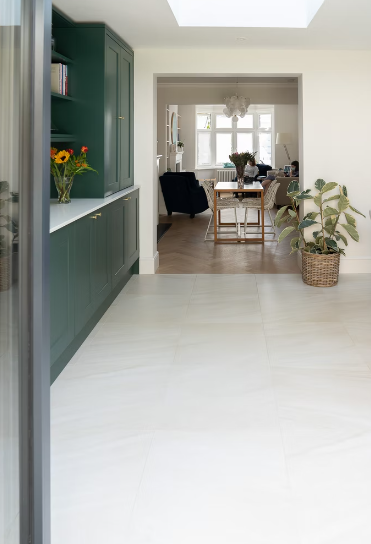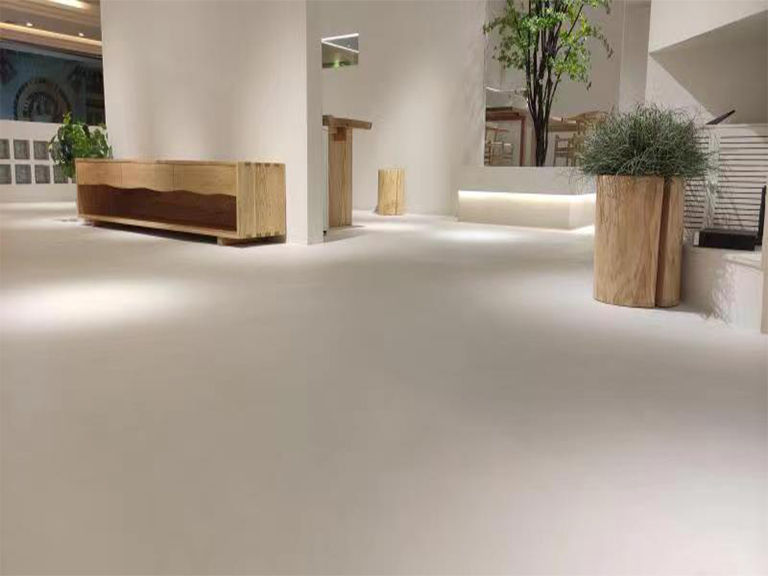Introduction
Welcome to successcrete’s guide to the best self-leveling concrete for 2023.
Are you considering a Self leveling cement floor for your commercial space?
There are many advantages to having this type of floor; however, there can be some drawbacks as well.
Installing a new floor is not easy, it’s actually three layers deep!
To ensure the best-finished product, you’ll need to choose self-leveling concrete for that key second layer – and no ordinary mix will do.
With this special blend of concrete on your side, achieving an even surface is as easy as ever – only then can you top off with wood or tile for all those admiring eyes above.
In today’s blog post, we’ll explore the pros and cons of Self leveling cement floor so that you can make an informed decision about installing one in your business space.
From easy maintenance to potential problems with installation, this overview will help ensure that you choose a flooring system that meets your needs and expectations.
Let’s dive deep into understanding the practicality of investing in a self-leveling floor for your company!

The blog will include the following content:
- What is self leveling cement?
- Advantages of self leveling cement floor
- Disadvantages of self leveling cement floor
- How to Use self leveling cement floor
- Notes as required during the installation
1. What is self leveling cement?
Self-leveling concrete has polymer-modified cement that has high flow characteristics and, in contrast to traditional concrete, does not require the addition of excessive amounts of water for placement.
Self-leveling concrete is typically used to create a flat and smooth surface with a compressive strength similar to or higher than that of traditional concrete prior to installing interior floor coverings.
Self-leveling concrete has increased in popularity as the degree of flatness and smoothness required for floor covering products has increased, with vinyl goods becoming thinner and floor tiles becoming larger, for example.
Self-consolidating (or self-compacting) concrete (SCC) is a separate type of highly mobile (fluid) concrete formulation, which is based on superplasticizers and is therefore also somewhat self-leveling.
Self leveling cement floor
Trying to level out a surface? Water-based self-leveling concrete could be the solution!
This convenient, powdery compound comes as an easy bag of mixture that just needs water – no need for any acrylic liquid.
It’s perfect for first-time DIYers looking to get the job done with ease and success.
Self-leveling concrete is the perfect solution for a smooth and even floor.
It’s poured in liquid form and then molded with a measuring tool so it sets perfectly smooth.
Applied between 0.25 – 1.5 inches thick, this modernized material boasts greater compressive strength than conventional concrete floors – creating stronger support for whatever you have planned next!
If you’re installing a new floor, self-leveling concrete makes the job easy! In as little as an hour or two, after it’s applied, this special type of cement will be smooth and all set.
Overlays and stains can even be used to customize your look – so in just six hours total.
Self-leveling concrete is most often used as a bedding layer for self-leveling cement floors, tile, or other floor coverings.
After application, the concrete can be decorated with overlays or concrete stains and dyes.

2. Advantages of self leveling cement
Suitable for DIY
If you’re looking for a way to create flat, even surfaces without the headache of messy mud-mining tools or full concrete replacements, self-leveling concrete are your best bet.
This easy install option not only works on uneven and cracked floors pre/post-construction – it’s simple enough that anyone can give it a go!
So don’t worry if you’ve never tried DIY before; with some help from Self leveling cement floor creating level floor space has never been easier.
Applicable in many places
Not only is it great for smoothing out rough surfaces in basements and other places, but you can also use it as a reliable standalone finish that adds extra durability.
It’s perfect to use anywhere from retail stores, warehouse floors, institutional facilities, and industrial premises.
Durable & beautiful
The self-leveling cement floor is the perfect floor covering to add an industrial flair and stand up against whatever life throws its way.
Not only that, but you can even customize it with stain additives for a unique look tailored specifically to your space’s design style – creating stunning finishes when paired perfectly with paint or tile accents!
Lower Cost
Looking to save money and reduce the risk of future repair costs?
Self-leveling concrete may be just what budget-conscious homeowners need.
It’s an affordable flooring option that creates a smooth, level surface on top of any type of existing tile, plywood, or conventional cement.
If you’re in the market for a leveled floor, Self leveling cement floor is your ticket to savings.
Not only does this special concrete save money compared with hiring an expert, but most professionals are also even using it themselves these days!
Since water is not required to set the self-leveling, it is less likely to be over-watered.
Less harm
With self-leveling concrete, you don’t have to worry about triggering allergies like you can with conventional concrete; plus it’s less likely for mold to crop up.
That means your project is safe and won’t be ruined by someone accidentally stepping in the wet mix! Even better news – since this type of cement dries fast, you’ll soon get that next stage underway quicker than normal.

3. Disadvantages of self leveling cement
When Not to Use Self-Leveling Concrete
Self-leveling cement can make a DIY project much easier, but that doesn’t mean it’s always the best solution. In some cases you might be better off with another product – so choose wisely!
Self-leveling concrete is the perfect option if you’re looking to get a super smooth floor in an indoor environment, such as your carport or garage.
However, when it comes to outdoor surfaces that have to battle weather extremes, this type of floor just isn’t up for the challenge.
Rather than the usual horizontal surfaces, self-leveling concrete isn’t up to snuff when it comes to vertical walls – plus any place that sees lots of activity from heavy machinery or harsh chemicals should steer clear.
If you’re dealing with a structurally damaged floor, don’t rely on Self leveling cement floor to be your savior.
While it can repair the surface, if there’s an underlying issue with subfloor orientation that won’t get addressed – so make sure those repairs are taken care of before trying out any levelers, or else you’ll find yourself in the same sinking situation all over again!
When crafting with self-leveling concrete, it pays to bring in a professional.
That’s because time is of the essence – you only have 20 minutes before your surface starts drying up and becomes unusable due to weather or other elements.

4. How to Use self leveling cement floor
Preparation
Before you can get started on your self-leveling floor project, the dust and debris need to be cleared out first.
You’ll also want to fill any cracks or holes with a sealer so that messy leaks don’t happen – sealing up sill seals around walls by nailing them in is one way of doing this.
To prevent messes from seeping into other rooms, make sure gutters and doorways stay blocked off during the job!
Whether you’re laying down a fresh floor or prepping for some other type of leveling, primer is the foundation.
Get your brush or roller ready.
Measurement
Once the primer’s dried, use a spirit level to check for any uneven spots on the floor.
If an area is not level, tilt the tool until the reading is level and record the height of the slope.
Screws can be drilled to match the height of that slope.
During the pouring process, use the screws to ensure that enough product is applied to the area and that the floor is level.
Mixing
To make your self-leveling concrete look perfect, start off by following the manufacturer’s instructions and mixing it just right.
Add cold water to a bucket then carefully pour in the powder before using an auger for mixing – ensuring you’ve got yourself one smooth concoction!
To be extra sure that everything is as should be, review some customer feedback or ask advice from a brand rep so you can get the proportions spot on and achieve liquid consistency.
Application
To get that smooth, even surface on your flooring project, start off in the far corner opposite of the doorway and move backward while pouring a water-based compound.
With this consistency just right, it should easily spread itself out as you go – but use a trowel or rubber broom to guide things along if needed!
Use the method of self-leveling cement
Apply primer
You’re almost done prepping the concrete for a new coat of paint. Give it one last push by applying primer with downward pressure to get into all those nooks and crannies, letting it dry completely before you move on—give yourself 3-24 hours!
Cooperation
Time is of the essence when working with the compound – having an extra pair of hands gives you a fighting chance to get your job done quickly. Don’t go it alone, team up and divvy up the tasks so one person can mix while another gets ready for application!
Summarization
If you’re looking for a fast-acting, easy solution to level out your wood, tile, or concrete flooring – self-leveling cement is the way to go!
This polymer-modified product can work its magic in just 4-24 hours and provide highly compressive flat surfaces.
Plus with no structural damage needed beforehand, it’s great for DIY projects around the home.

5. Notes as required during the installation
Other considerations
For any self-leveling concrete project, it’s not just about knowing how to use the material; you also need to find the perfect compound for your needs.
Consider factors like quantity needed and drying time, as well as desired floor strength – these are key elements that will help ensure success.
coverage area
Before buying concrete, think about the dimensions of your space and the depth you need.
The required thickness depends on what look or feel you’re going for as well as environmental conditions – slopes and inclines require more material than flat surfaces.
Once that’s all figured out, consult manufacturer info to see how much square footage each bag covers at a certain thickness – this will tell ya how many bags are needed.
To be safe though it might be wise to buy slightly more than necessary in case!
Drying Time
You have to keep an eye on the time, as at some point they’ll harden and that’s when you need to start installing tiles.
Ceramic tiles require less drying than moisture-sensitive materials – but getting your timing just right is key for all sorts of jobs.
Strength
Strong materials are important for reinforced concrete structures to ensure that heavy loads and pressures can be applied to the surface without cracking.
The strength of these products is usually determined by the compressive strength.
Compressive strength gradually increases over time, so our specifications highlight the maximum compressive strength after 28 days.
Conclusion
After reading this post, you should have a better understanding of the pros and cons of self-leveling cement floors.
If you are thinking about installing such a floor in your home, be sure to take these factors into consideration.
Ultimately, the decision is up to you but we hope that this article has helped give you some insight into what to expect.



